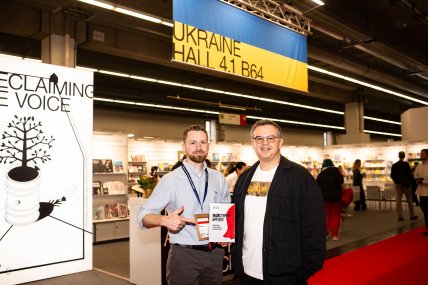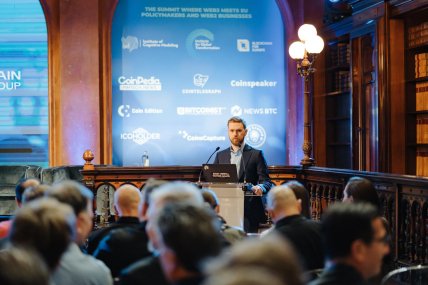"Tears for Ukraine have dried up": Political strategist Viktor Berezenko discusses changes in Europe, Trump, and the upcoming elections.
"We keep our finger on the pulse," says Viktor Berezenko in an interview with "Telegraph" about the upcoming elections in the country. In political circles, he is known as a political and social technologist who has worked with many prominent figures from various ideological backgrounds. Together with his partner Dmitry Tsarenko, he founded the Institute of Cognitive Modeling, which has collaborated with the "Servant of the People" party, various ministries, the U.S. embassy, and more.
Even before the war, they decided to enter the European market, establishing the Institute of Global Transformation, although Ukraine remains a priority. Viktor Berezenko spoke with "Telegraph" about whether their clients are preparing for the upcoming elections, the possibility of electronic voting in Ukraine, and what is happening in Europe after Donald Trump's victory and what it means for us.
"Russian disinformation is gaining momentum right now"
— What are you currently working on?
— Our primary focus is the Ukraine Facility Platform. Simply put, it’s European integration through business. We are developing projects that align with the government’s strategy for Ukraine’s recovery. Right now, in The Hague, we are organizing a conference with Open Door Ukraine on developing capacities for generating decentralized energy in Ukraine. This involves coordinating actions among businesses, local governments, and international financial institutions. Besides energy, we have several other areas. Each has its experienced experts, appropriate strategies, and implementation through specific projects, not just empty talk.
The largest part of our work since the start of the full-scale invasion has been collaborating with Western institutions to counter Russian disinformation across various territories, not just within the European Union.
In reality, we mentally know our enemy and understand the tools they use. Because, no matter how you look at it, a person from the post-Soviet space is still a person from the post-Soviet space, and to effectively counter the enemy, you need to comprehend how the enemy thinks, their tools, and so on.
Russians are very active in Europe, the United States, and worldwide, and unfortunately, they have achieved considerable success in their propaganda and disinformation campaigns. This year, they allocated a record budget for propaganda—around $2 billion officially. We can only imagine how much cash is being handed out in bags. The West is not allocating record amounts to combat disinformation.
— So there’s a lot of talk about the need to combat Russian influence, but this is not accompanied by actions?
— There are actions, but from what I see, they are definitely insufficient. Because if they were enough, Russian disinformation and propaganda would not be successful in the West.

— I would like to clarify how you combat Russian propaganda? It’s clear that you don’t go out with guns against it, but to fight it even in Europe requires significant funding. How does your work take place?
— We conduct informational campaigns, research, study all key narratives, identify trigger points, consult on detecting and countering disinformation, and we also directly carry out informational campaigns against disinformation. I can't discuss our tools because this is a very sensitive issue in the EU. Even when we work on counter-disinformation and counter-propaganda, we are very limited in our tools.
Russians face no restrictions; they can publish anything and spread any lies. We, even when collaborating with official European institutions, are bound by copyright and the EU's moral code. There are many such "buts."
— Why does the West need such analytics if it doesn’t intend to combat Russian propaganda, especially since Russian influence in Europe is rising again? Don’t you think you are wasting your time collaborating with these organizations?
— No, I don’t think so. If I don’t go to these institutions in Brussels to convey our position, if our colleagues don’t do it, if our official representatives from the government, public sector, and private businesses don’t come, we will lose very quickly.

"There are no realistic grounds to believe that elections will take place"
— Do you collaborate with Ukrainian state structures?
— We help Ukrainian state institutions with all our strength and resources.
— It is known that your Institute of Cognitive Modeling has long collaborated with the Ministry of Digital Transformation. Also, your recently published book on Russian disinformation, "Workshop of Lies," was signed by Minister Mykhailo Fedorov. Does this indicate that you are still collaborating with the Ministry of Digital Transformation while being in Europe?
— We have good relations with the Ministry of Digital Transformation, and we help them as much as we can upon request.
— Is this collaboration with the Ministry of Digital Transformation funded?
— Sometimes it’s pro bono work (for the public good. — Ed.). Because we ideologically align with them. Sometimes donors cover some costs, but there is no state funding. For us, this is not a commercial activity.
— In Ukraine, you are also known as a political technologist.
— No, there is no political process in Ukraine right now.
— I would argue about the absence of a political process.
— In my opinion, there is no real political process at the moment because the country is at war. Recently, especially in the last two months, everyone has been so agitated that elections are just around the corner. But I can say for sure that we are in touch with everyone, we communicate with everyone, but we are not collaborating with anyone today. We keep our finger on the pulse when these people are in Brussels; we meet and talk.
However, I currently have no realistic grounds to believe that elections will take place. Right now, it’s just a fantasy. Maybe someone wishes so, maybe there are some expectations. But if we face reality, it’s hard to even think about elections; the most important things are happening on the battlefield right now.
— You say you keep your finger on the pulse, that you meet with someone. Can I conclude that people are reaching out regarding your services, asking questions?
— Not only concerning services; we have normal human relationships with many. We have known each other for many years and simply communicate. In general, it is often just human interaction, not only business relationships.
— Perhaps among these people were representatives of the President’s Office or Kyiv Mayor Vitali Klitschko, with whom you used to collaborate?
— No, not in terms of work. Within the framework of simple human relationships, we communicate with many people in all institutions.
— Among those you keep in touch with, are there people who genuinely believe and are waiting for elections in 2025? What do they base this on?
— Among them are quite experienced people. And they, in my opinion, cannot be 100% sure right now. Just in case, someone is preparing. But they were also preparing a year ago.
If we recall, in 2023, many said that by the fall of 2024, elections would definitely happen, but in reality, nothing occurred. I view it differently: when there is fish, we will fry it. And the people I communicate with are more oriented towards being prepared just in case, but no one is making high bets.
"There is a military political landscape and all other players"
— What does it mean to "be prepared"? To have money, a team, or something else?
— At a minimum, it means having an internal understanding of the country’s future political architecture. What it could be, who might come to power, who has chances, what place you might occupy in this configuration, what players and figures are involved.
— Have you thought about this architecture?
— I can say that right now, based on social research, there is an extremely high level of trust in the military and a separate level of trust in all other players. There is a military political landscape, and there are all other players. How the configuration will shape concerning all other players, I truly do not know. The military will definitely be at the top.
— Do you think pro-Russian forces will succeed again in Ukraine?
— In my opinion, open pro-Russian forces will not succeed in Ukraine. But judging by social research, certain political forces that position themselves as neutral, not ultra-patriotic, and not ultra-Western have a layer of society on which they can potentially play. So, regarding negotiations and language issues, according to studies, they have potential for work. I do not currently understand how significant this potential is, whether they have a chance to overcome the electoral threshold or not. In general,